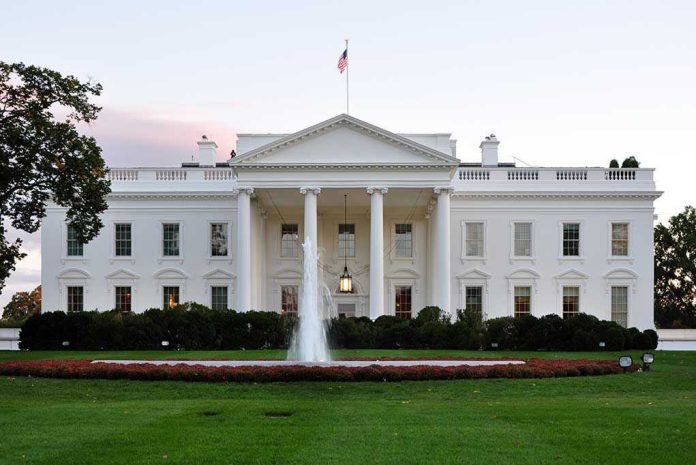
Kamala Harris’s memoir exposes deep fractures in the Biden White House, revealing how internal sabotage and lack of support shaped her failed political ambitions—raising serious questions about the integrity and unity of the previous administration.
Story Snapshot
- Kamala Harris alleges Biden’s staff actively fueled negative narratives about her during her vice presidency and 2024 campaign.
- Her memoir, released September 2025, details a lack of support and deliberate undermining by the White House communications team.
- The Democratic Party faces renewed scrutiny over internal divisions and communications failures just as the story resurfaces.
- Experts note this case highlights persistent dysfunction and risks to party unity, with long-term effects on political legacies and trust.
Harris’s Memoir Reignites Debate Over White House Dysfunction
In September 2025, excerpts from Kamala Harris’s memoir “107 Days” sparked a fresh storm, as the former vice president accused President Biden’s staff of not merely failing to defend her against negative press, but actively contributing to damaging narratives about her management and public image. Harris’s allegations, detailed in her book and widely reported by major outlets, paint a picture of an administration plagued by internal strife and a communications team unwilling to support its own second-in-command. These revelations have renewed debate over the lasting effects of the Biden administration’s approach to managing dissent and protecting its senior officials.
Harris describes a pattern of neglect and even sabotage by the Biden White House, citing specific incidents such as her 2021 diplomatic trip to France—where coverage focused on her alleged use of a “French accent” rather than diplomatic achievements—and the persistent leaks about her office’s turnover and dysfunction. According to Harris, much of the negative press was not merely a product of external media bias but was fueled by anonymous sources within the administration, including Biden’s inner circle and communications staff. This dynamic, Harris asserts, directly undermined her 2024 presidential campaign, which failed amid a barrage of negative publicity and limited institutional backing.
Power Struggles and Communications Failures Shaped the Biden Era
The struggle between Harris and the Biden team reflects longstanding challenges faced by vice presidents, especially when their roles are ambiguous or when internal rivalry is perceived. Under Biden, Harris was tasked with high-profile, politically toxic issues—most notably immigration—placing her in the crosshairs of public scrutiny. The White House communications team, led by Karine Jean-Pierre, drew particular criticism for not defending Harris against damaging stories or taking action to counter negative leaks. This hands-off approach created a climate in which negative narratives flourished, amplified by media organizations eager for insider drama. The result was a vice presidency defined less by policy achievement and more by stories of turmoil and dysfunction—many of which Harris now claims were stoked from within.
Within the Democratic Party, these revelations have reignited concerns about internal unity and the ability of party leaders to manage dissent constructively. Senior advisers and staffers in Biden’s inner circle wielded significant influence over narrative framing, and their actions now appear to have lasting repercussions not only for Harris’s reputation but also for the Democratic Party’s image of cohesion. Similar problems have emerged in past administrations, but the scale and visibility of Harris’s complaints—now immortalized in a memoir—bring renewed attention to the risks of unchecked internal rivalry and communications breakdown.
Broader Implications: Party Cohesion, Political Trust, and Legacy
The fallout from Harris’s memoir extends well beyond personal grievances, touching on broader questions of party cohesion, political trust, and the long-term management of high-profile officials. In the short term, the Biden team and the Democratic Party face embarrassment and renewed media scrutiny, especially as they struggle to address the perception of disunity. Over the long term, Harris’s experience may prompt future administrations to reevaluate how they support vice presidents and manage internal communications, recognizing the dangers posed by leaks and factionalism. For Harris, the memoir serves as both a defense of her legacy and a warning to others about the consequences of unchecked internal conflict.
Kamala Comes Out Swinging At Team Biden In New Book
✍️: @reaganreese_
https://t.co/PyjtEWBXQM— Daily Caller (@DailyCaller) September 10, 2025
Experts in political communications emphasize that vice presidents are especially vulnerable to negative narratives when not actively supported by the president’s staff. While some commentators suggest that Harris’s complaints reflect wider issues of gender and racial bias, others argue that the dysfunction revealed is a bipartisan phenomenon, exacerbated by the relentless demands of the 24-hour news cycle and the rise of social media. Ultimately, Harris’s account underscores the critical importance of unified messaging, robust support structures, and transparent communications in any administration—lessons the American public will no doubt weigh as the political landscape continues to shift.
Sources:
More White House gaslighting about Project 2025? We won’t be fooled.
Kamala Harris complains about ‘impossible’ lack of support from Biden’s comms team, inner circle
Leading With Cruelty: Eight Impacts of Trump’s First Day Executive Orders
Addressing Risks Associated with an Egregious Leaker and Disseminator of Falsehoods
Melania Trump Issues an AI Challenge for Students. Will It Help Build AI Literacy?









